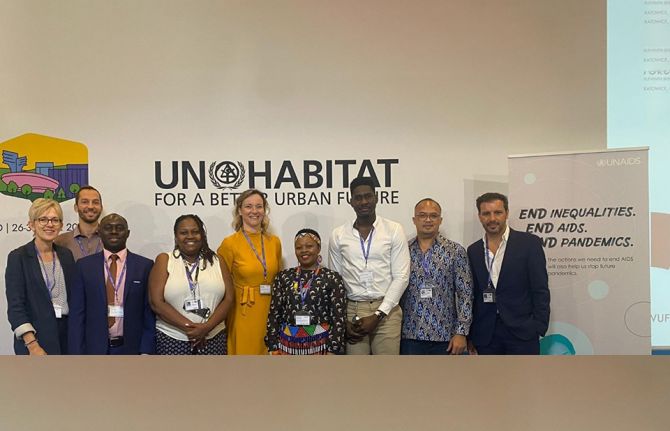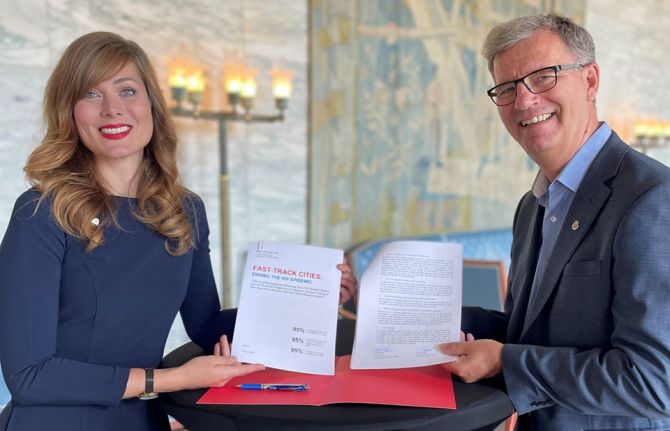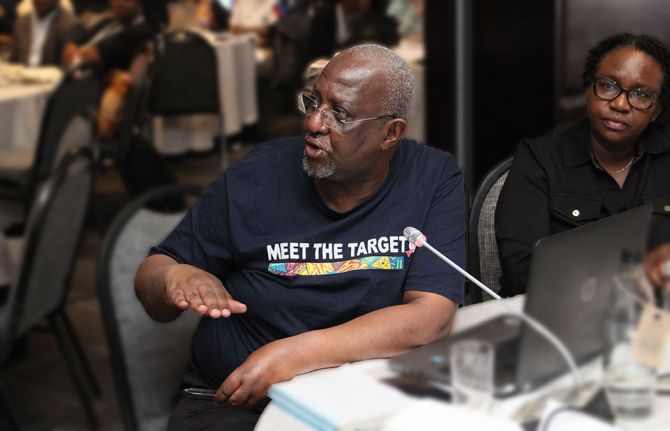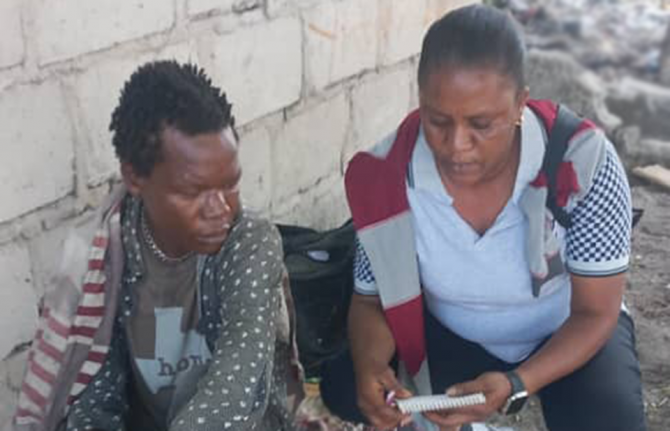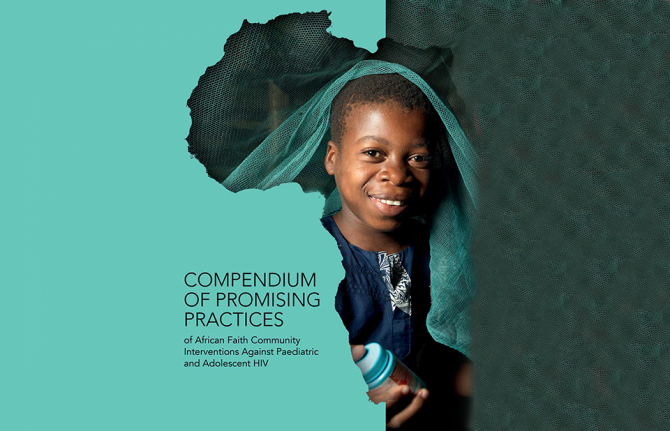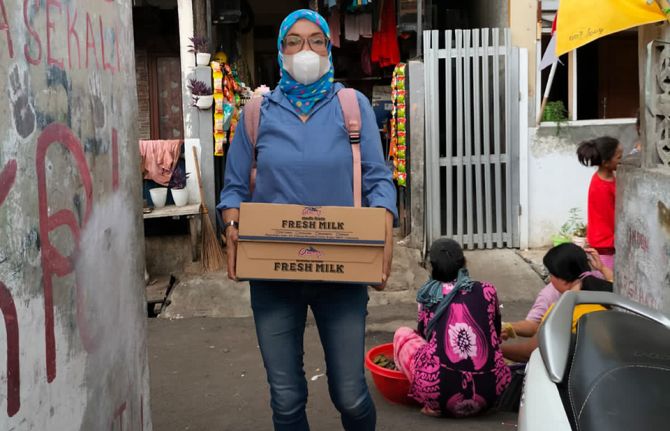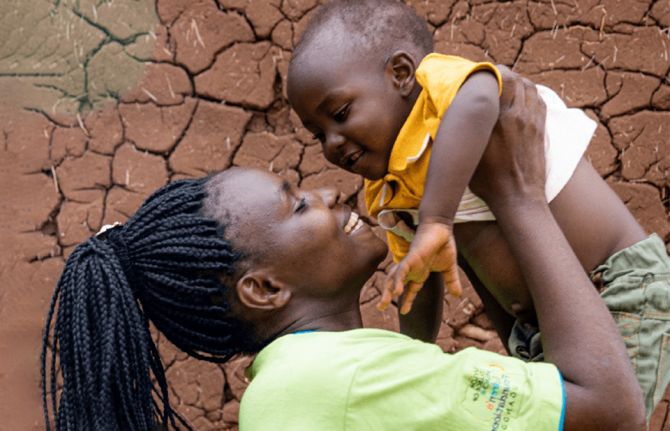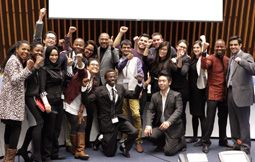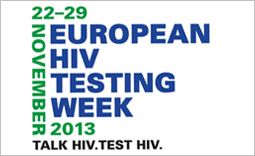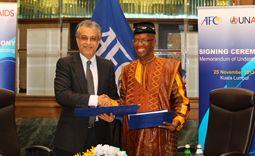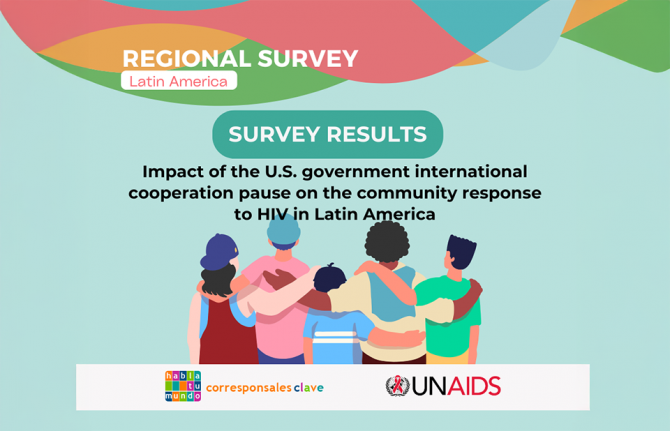
Feature Story
Economic security for women key to HIV prevention
08 March 2006
08 March 2006 08 March 2006
A new paper published today by the UNAIDS-led Global Coalition on Women and AIDS (GCWA) shows that when women have an income and a safe place to live, they are much better able to negotiate abstinence, fidelity, and safer sex. Economic security, the paper stresses, is a major factor in enabling women to protect themselves from HIV.
Today, however, of the 1.2 billion people living on less than US $1 a day, 70% are women. They also represent almost half of all people living with HIV globally.
When women are economically and financially dependent on male partners and family members, their bargaining power over sexual matters can be reduced, making them more vulnerable to HIV. Where women lack property rights, they suffer restricted economic options, reduced personal security, poverty, violence, and homelessness. Poverty can also encourage risky livelihood measures, such as enduring an abusive relationship or engaging in unsafe sex in exchange for money, housing, food or education.
Women whose partners fall sick and die, particularly of AIDS, frequently suffer discrimination, abandonment, and violence. In some regions, when their husband dies, women can lose their homes, inheritance, possessions, and livelihood. “My husband’s family took farm equipment, livestock, cooking pans, bank records, pension documents, house utensils, blankets and clothes… They said they had bought me [with a dowry] and therefore I had no voice in that home” says Emily Owino of Kenya.
With sick children, and no money to buy food or clothes, Emily went to stay with her own family. When she came back to take up residence in her marital home, she discovered that her land and her last few possessions had been taken. “I was destitute,” she says.
To help women like Emily, the UNAIDS-led Global Coalition works on securing women’s property rights. In 2005, it initiated a small grants programme to support nine organizations in sub-Saharan Africa that are implementing innovative projects to advance women’s property rights in the context of HIV and AIDS.
The Zimbabwe Widows and Orphans Trust (ZWOT) is one such organization. “The widows who come to ZWOT have absolutely nothing” says founder Susan Zwinoira. “Their morale is low and they have no resources. They often come to us looking for legal assistance. We start by getting as much information as we can from the widow and then we determine which route is best to follow. Negotiations with the family are sometimes successful. But where they fail, matters can end up with the police, in court… Every Tuesday and Thursday we receive a welcoming reception. We have even started to call them “Widows’ days”.
Another grant recipient is the Rwanda Women's Network. Its Director Mary Balikungeri explains: “The Network was established in 1995 to support widows and orphans who survived the genocide. We started a low-cost housing project for widows and constructed about 200 houses all over the country which are now occupied by widows. We are also promoting nutritional gardening. Each woman who was given a small house has a small gardening plot but it is too small. We plan to negotiate with local authorities to provide us with a collective farming plot.”
Securing property and inheritance rights for women and girls has clear value in HIV prevention. Many promising initiatives are using microfinance and skills training to improve women’s access to economic assets, such as land, property and credit, and to reduce their vulnerability to HIV.
Read the Global Coalition on Women and AIDS Issues Brief on Property Rights
Related links
Global Coalition on Women and AIDS
Zimbabwe Widows and Orphans Trust
Related

Feature Story
Salif Keita performs at UNAIDS fundraising concert in Athens
03 March 2006
03 March 2006 03 March 2006
On 1 March Salif Keita, one of the world’s greatest musicians, was in Athens performing in front of a packed audience at the Greek Opera House. This was a unique event as it was the first time a concert, other than classical music, was held at the Opera House. The concert was a fundraising event for UNAIDS, organized by Ms Mero Kececioglu-Kylicas, UNAIDS Special Representative and President of the Foundation for Greek Action in Africa.
Prior to the concert opening, UNAIDS Executive Director Dr Peter Piot reminded the audience that AIDS affects everyone. “There isn’t a single country untouched by the epidemic,” he said. He went on to describe AIDS as “one of the greatest challenges and threats to the 21st century”, given that it has killed more than 25 million people and infected an additional 40 million worldwide. He concluded on a hopeful note by saying, “we can defeat this epidemic if every one of us gets involved in fighting it, in whichever way we can….because united, we can win.”
Dr Piot was in Athens as part of his first official visit to Greece. He met with the Greek Minister of Health, Dimitrios Avramopoulos, and Deputy Minister of Foreign Affairs, Evripidis Stylianidis, to strengthen collaboration between UNAIDS and the Greek Government. Their discussions focused on the fight against AIDS in the world’s worst-affected region, sub-Saharan Africa, as well as on the Balkans and the former Soviet republics, which are experiencing rapidly growing epidemics. The Greek Government is in the process of developing a cooperation agreement with UNAIDS.
During the meetings, Greece reiterated its commitment to the fight against AIDS, focusing particularly on the need to tackle human trafficking from the Balkans and the former Soviet republics. Immigrants from these regions, as well as from Africa, make an important portion of Greece’s population of 9 million, and there has been an influx of sex workers into Greece. This is why human trafficking has been a priority for the Greek government. The Greek government and AIDS NGOs are responding to the problem by offering free health services, including HIV testing, counseling, and treatment through the public health systems.
The number of people living with HIV in Eastern Europe and Central Asia reached an estimated 1.6 million in 2005 – a twenty-fold increase in less than 10 years. Russia has the biggest AIDS epidemic in Europe with an estimated 860,000 people living with HIV. Russia’s and Ukraine’s epidemics continue to grow at a rapid pace due to the interplay between injecting drug use and unsafe sex. HIV is affecting larger parts of society, with more women testing HIV-positive each year.

Feature Story
Innovative AIDS funding takes off
28 February 2006
28 February 2006 28 February 2006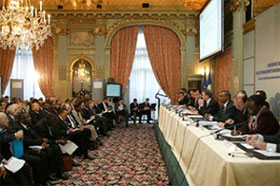
Plenary session at the CCI in Paris. Photo: © F. de La Mure/MAE
For several years now, the international community has been looking for new tools to ensure sustained financing for development and the fight against poverty. A recent international conference on “Solidarity and Globalization: innovative financing for development and against pandemics”, held in Paris, brought together more than one hundred countries from the around the world as well as,18 international organizations and 60 NGOs to discuss the implementation of innovative financing for development. Since the declaration of 14 September 2005 which encourages further work on an international solidarity contribution the principle of innovative sources of financing is now receiving support from a large part of the international community.
French President Jacques Chirac announced that several countries agreed to use an air-ticket tax to respond to AIDS, TB and malaria. This innovative source of funding would be used to facilitate access to HIV treatment by assuring the long-term production of ARVs. This tax is expected to generate revenue of up to € 200 million per year for France alone.
Programmes that work to alleviate poverty and to help achieve the Millennium Development Goals need long-term stability and continuity and can suffer from the unpredictable flow of funds. Without new sustainable long term funding mechanisms it will be difficult to scale-up HIV prevention, treatment, care and support and come as close as possible to universal access by 2010. “New innovative sources of financing are absolutely necessary,” said UNAIDS Executive Director Dr. Peter Piot.
During the conference France proposed the creation of an international facility for drug purchases providing sustainable and affordable access to ARV treatment. This kind of facility could assure the pharmaceutical industry of continuous funding and demand which could then in turn lower drug prices. “The demand for ARVs will constantly rise in the next few years. More and more people will get sick and more and more people will know they have HIV. That’s why it’s so important that we develop long term sustainable funding mechanisms which will allow us to continue treating people in 20 or 40 years” said Dr. Piot.
In addition to France and Chile which have already adopted the legislation and the UK which has a similar tax, Brazil, Norway, Niger, Madagascar and Mauritius announced that they would immediately create an airline ticket tax. Seven other countries are expected to make similar announcements. Approximately 30 countries will take part in a working group for the creation of a tax in the long-term.

Feature Story
UNAIDS and partners reach out to young military recruits in Brazil
27 February 2006
27 February 2006 27 February 2006
Packed with 750 young navy cadets, the Rio de Janeiro’s Naval School hosted representatives from the Brazilian Ministries of Defense and Health, UNAIDS and UNFPA to launch the STD, HIV and AIDS Prevention Programme in the Armed Forces and Military Academies.
Conceived as a follow-up to the 2004 Agreement between UNAIDS and the Brazilian Government to strengthen prevention among the country’s conscripts, the project aims to enhance military capacity to plan, monitor and evaluate prevention activities.
The programme will also integrate HIV prevention in military schools curricula and Armed Forces training courses. “There is a correlation between low education, low information and HIV. Those who have more access to information are better protected” said Admiral Carlos Edson Martins da Silva, Coordinator of the Programme in the Brazilian Ministry of Defense.
With more than 310,000 personnel stretched across the country, the Armed Forces are a key actor in Brazil’s HIV prevention. Brazil’s well structured health services are available not only to military personnel, but also to civilians in remote regions otherwise without access to public health services. Brazilian Government also produces generic antiretroviral drugs that are available to the population at reduced prices.
New course materials include a training guide and a peer education toolkit, and are specifically adapted to the Brazilian setting. “Providing information alone is not enough. We need to change attitudes and you will be the agents of this change”, Dr. Andrea Boccardi, UNAIDS Latin America Regional Advisor for AIDS, Security and Humanitarian Response addressed the navy aspirants attending the launching ceremony.
HIV prevention efforts in Brazil’s Armed Forces date back to the 90’s. The research carried out between 1996 and 2000 by Brazilian Ministry of Health shows a consistent increase in the use of condoms among young conscripts, from 38% in 1997 to 50% in 2000.
For more information, please contact Naiara G. da Costa Chaves (UNAIDS - Brasil) naiara@undp.org.br

Feature Story
On the frontline: Chinese star speaks out on AIDS
21 February 2006
21 February 2006 21 February 2006
Wenli Jiang won China’s highly-revered ‘Flying Goddess Award’ for Best TV Actress in 1999. Her husband, Changwei Gu, is a cinematographer-turned-director, who won the Silver Bear at 2005 Berlin International Film Festival with Peacock. They have a 5 year-old son.
Photo by Xinhua.
The first time Chinese TV star Wenli Jiang took part in a public HIV prevention and awareness raising event, in 2003, she was decidedly nervous.
Standing on a temporary stage set up in the most popular shopping section in Beijing, she looked out at the shoppers, holding a sheaf of condoms in her hand.
Crowds started to form as passers by recognized Jiang, who shot to fame in China through a TV series called “Holding Hands” where she played a modern housewife disillusioned with her marriage.
“I felt quite embarrassed that first day,” said Jiang, “but the more I participated in these kinds of events, the more I got used to them and felt comfortable.” So much so that in 2004, Jiang handed out 6,000 condoms in one hour in Bangkok’s red-light district with fellow Chinese actor Cunxin Pu.
A Leadership Council member of the UNAIDS-led Global Coalition on Women and AIDS – and the first female spokesperson in China’s HIV prevention campaign – Jiang explains why she is so committed to fighting AIDS and the stigma surrounding it.
“I feel a sense of responsibility to help people living with HIV, and call for the elimination of misunderstanding and discrimination against them,” said Jiang. She is especially interested in promoting the recognition of women and children’s rights.
Her interest in the AIDS response began in 2002 when she made a TV spot with a young boy living with HIV. “The first time I met the little boy living with HIV I felt so shocked and sympathetic. I had a strong desire to do something to make a difference.”
Now, Jiang is well-known for promoting awareness about HIV prevention in China. Her face can be found on HIV prevention posters in subway stations and along main streets in many Chinese cities, including the capital Beijing.
In February, 2004, Jiang joined fellow actress Emma Thompson and other celebrities and leading figures working to reduce the impact of AIDS on women and girls at the London launch of the UNAIDS-initiated Global Coalition on Women and AIDS.
“The London meeting was my turning point,” said Jiang, “I was captivated by the passion of the UNAIDS staff and other delegates from other 24 countries. I realized that besides just attending meetings and events, I could really move my commitment forward.”
In 2005, Jiang invited an 11-year-old child living with HIV from the Anhui province, to live with her family for a number of days. “I wish all children living with HIV could be free to go anywhere and do anything that they want without being discriminated against,” Jiang said.
UNAIDS Country Coordinator for China Joel Rehnstrom underlines the importance of Wenli Jiang’s involvement in the fight against AIDS for the country. "Celebrities such as actress Wenli Jiang play an important role in China in raising awareness about AIDS. By appearing in public with a person living with HIV, Wenli Jiang helps reduce fear, shame and stigma related to AIDS," he said
Wenli Jiang’s first book, entitled Wenli Talks about AIDS was published last December. All profits from this book will be donated to AIDS related organizations, said Jiang. “The book introduces basic information about AIDS, and shares my experiences as an HIV prevention activist with readers,” Jiang said. “I want to make readers aware – and then ignorance of AIDS cannot be used as an excuse.”
“My dream would be for everyone in China to volunteer as an AIDS activist,” said Jiang, “Please do tell your friends and relatives to keep away from drugs, use condoms and lead a healthy life,”
“My objective this year is to shoot a documentary about AIDS in China. Everything is being planned now,” she said excitedly, “it will be my directorial debut.”
Related

Feature Story
UNAIDS and partners launch ‘living positively’ book in Tanzania
17 February 2006
17 February 2006 17 February 2006
When young Tanzanian Vumilia Omar told her husband she had tested HIV positive, his reaction was one of anger and fury. “He didn’t want to look at me or our children,” she said, telling how her husband then left the family home taking all their possessions with him and leaving Vumilia and her children with nothing and nowhere to go.
Over time, Vumilia has slowly rebuilt her life – seeking advice from counselors and choosing to stand up against the stigma and discrimination she has often faced because of her HIV status. She now runs a successful tomato-selling business in the markets of Dar-es-Salaam and discusses her experiences as a young mother living with HIV in her own column in a popular magazine.
“I use more and more of my time to educate people on HIV and give advice to young people about living positively and how to live with hope,” she said.
Vumilia’s story is one of a collection of 26 similar testimonials of Tanzanians ‘living positively’ with HIV that feature in the book ‘Yaliyopita Si Ndwele’ (Life goes on), which was launched today in Dar-es-Salaam.
The book – produced jointly by UNAIDS and non-governmental organization FEMINA-HIP, with funding from Development Cooperation Ireland – was launched by UNAIDS Executive Director Dr Peter Piot at a special ceremony held as part of the high-level joint mission to the country of HRH Princess Mathilde of Belguim and the Executive Directors of UNAIDS and UNICEF.
The joint mission is visiting Tanzania from 14-17 February to gain a deeper understanding of the challenges AIDS poses for children and young people and the country’s AIDS response to date.
At the book launch ceremony, one of the collection’s authors, 13-year old Irene Kabaka, gave a statement to the delegation before handing a special copy of the book to HRH Princess Mathilde.
“Although there are only 26 stories, I am sure many people will relate to them,” she said.
In the foreword of the book, the head of the Tanzania Commission for AIDS (TACAIDS), Major General Lupogo said, “I’m impressed with the bravery of all who have broken the silence, by sharing their stories. They give strength and understanding to other citizens who will now understand their situation with empathy and humility,” he added.
‘Yaliyopita Si Ndwele’ (Life goes on) is available in Swahili. For more information, please contact FEMINA-HIP at femina-hip@raha.com
Read Vumilia’s full story from the collection, in English
Read the foreword of the collection by Major General Lupogo, Head of TACAIDS
Related
 “Who will protect our young people?”
“Who will protect our young people?”

02 June 2025
 Impact of US funding cuts on HIV programmes in Uganda
Impact of US funding cuts on HIV programmes in Uganda

19 March 2025

Feature Story
AIDS mission to Rwanda to discuss coordination, next steps in AIDS response
13 February 2006
13 February 2006 13 February 2006This week, leaders from Luxemburg, United Kingdom Department for International Development (DFID), UNICEF and the Joint United Nations Programme on HIV/AIDS (UNAIDS) are visiting Rwanda for a two-day, high-level mission to gain a joint perspective on the progress of the national AIDS response and the ongoing challenges it faces.
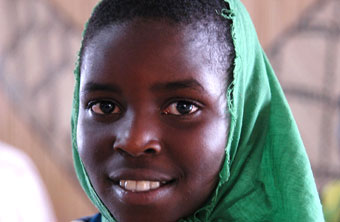
Joseline Nyiraguhimwa, age 11, at the site of the IMPORE Association, Prevention of Mother to Child Transmission Centre in Kacyiru, Rwanda. She has lost her father and lives with her mother.
Photo credit: UNAIDS/Riccardo Gangale
Over a quarter of a million people are estimated to be living with HIV in Rwanda, according to UNAIDS 2003 figures.
Over the last years – and against a backdrop of extremely difficult circumstances - the country’s AIDS response is showing encouraging signs of progress.
Political commitment to tackling AIDS is high, with the personal involvement of the President and the First Lady. The expansion of the country’s AIDS programme points to a welcome trend. Services to prevent mother-to-child transmission are available at 50% of all health centres in the country, sites offering voluntary counselling and testing have increased, and according to national estimates the number of people receiving antiretroviral therapy rose from 8700 in 2004 to more than 19000 by end 2005, a more than 50% increase. Over the past years, trends among pregnant women indicate signs of a decline in HIV prevalence in some areas.
But the country faces ongoing challenges to more rapid progress. Women are particularly hard hit by HIV in Rwanda - recent national data suggests that women aged 15 - 24 years old have five times the HIV prevalence rate than men of the same age group.
Children also need greater attention. Rwanda has one of the highest proportions of orphans in the world – 1.25 million, and in 2003 it was estimated that Rwanda had 22,000 children under 15 living with HIV.
This week, leaders from Luxemburg, United Kingdom Department for International Development (DFID), UNICEF and the Joint United Nations Programme on HIV/AIDS (UNAIDS) are visiting Rwanda for a high-level mission to gain a joint perspective on the progress of the national AIDS response and the ongoing challenges it faces.
Mr Jean-Louis Schiltz, Luxemburg Minister for Development Cooperation and Humanitarian Action; Sir Suma Chakrabarti, Permanent Secretary, United Kingdom Department for International Development (DFID); Ms. Ann M. Veneman, Executive Director of UNICEF and Dr Peter Piot, Executive Director of UNAIDS are meeting with representatives of the government including President of Rwanda, H.E. Paul Kagame and First Lady Mrs. Jeannette Kagame, civil society, UN and donor agencies to gain a collective understanding of the current challenges and opportunities for the AIDS response in Rwanda. Central to the mission is the exploration of ways to improve partner harmonization at all levels.
As part of the visit, the delegation is also visiting some key community-based programmes that provide care and support to people living with HIV, child headed households as well as prevention services, including HIV testing and counselling.
“Rwanda’s AIDS response is showing some significant positive trends which underline the commitment in the country to seriously tackle AIDS. This joint mission is a key opportunity for AIDS leaders and key players in the Rwandan response to revise the current situation and make concrete recommendations for future action,” said UNAIDS Country Coordinator, Dirk Van Hove.
View more photos of Mission to Rwanda
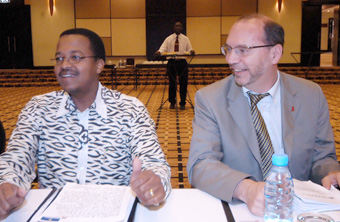
Kigali, 12 February 2006
Executive Director of UNAIDS Dr Peter Piot, (right), sits next to Dr. Innocent Nyaruhirira, Rwandan Minister of State in charge of HIV/AIDS.
Photo: UNAIDS/Riccardo Gangale
Related
 “Who will protect our young people?”
“Who will protect our young people?”

02 June 2025
 Impact of US funding cuts on HIV programmes in Uganda
Impact of US funding cuts on HIV programmes in Uganda

19 March 2025

Feature Story
World Not Doing Nearly Enough to Protect Children Affected by AIDS
09 February 2006
09 February 2006 09 February 2006Third Global Partners Forum Focuses on Protection, HIV Prevention, Treatment, Care
The global response to children affected by HIV and AIDS does not come close to matching the enormity of their rapidly expanding plight. By 2010 an estimated 18 million children in sub-Saharan Africa alone will be orphaned by the disease. Children living with sick and dying parents remain extremely vulnerable, and an estimated 4 million infected children do not have access to appropriate treatments.
This year’s Global Partners Forum, hosted by UNICEF and the UK Department for International Development (DFID), has brought together high level representatives from 90 international organisations, NGOs and governments in an effort to ramp up practical responses to the suffering of millions of children caught in the AIDS pandemic.
“Children are missing from the world’s response to the global AIDS pandemic,” said UNICEF Executive Director Ann M. Veneman. “Less than 10 per cent of the children who have been orphaned or made vulnerable by AIDS receive public support or services.”
This year’s forum will focus on ways to:
- Strengthen the capacity of families to protect and care for orphans and other children made vulnerable by HIV.
- Mobilize community-based responses to support affected families.
- Ensure equal and full access to education.
- Guarantee universal access to HIV prevention, treatment and care.
The forum will underline that communities and families should be the primary beneficiaries of an increased global AIDS response. A mix of economic assistance should be provided including direct cash grants for affected families, small loans and funds to pay community outreach workers.

“This is a crucial time in our global efforts to tackle HIV and AIDS- and a time to turn commitments into action,” said UK International Development Minister Gareth Thomas. “We must ensure that the needs of children are central to this and ensure that communities can fulfill their potential.”
Care and support for vulnerable children should not be limited to their material needs. More effort is required to provide orphans and other children traumatized by AIDS with counseling and psychosocial support.
To date, non-governmental and faith-based organizations as well as community groups have pioneered assistance to children and communities. Funds are needed to expand proven responses from pilot interventions to nationally scaled programmes.
Improving Access to Education
Education is one of the most important weapons against the spread of AIDS. The evidence for this is growing: in countries with severe epidemics, young people with higher levels of education are more likely to use condoms and less likely to engage in casual sex than less-educated peers. Educated children are also more likely to escape the poverty trap that ensnares orphans and children forced to take care of sick or dying parents.
However school fees remain a powerful barrier to educational access for the very children most at risk in many countries affected by AIDS. Ending school fees at the primary level is an essential step to achieving universal education. It can only be sustained if the international community increases funding to governments making the bold move to abolish school fees. With the abolition of primary school fees in Kenya, for instance, 1.3 million new pupils have poured into class rooms.
Ensuring that girls get equal access to education is also vital, especially as girls are disproportionately affected by HIV and AIDS. The UK government is a key partner in the United Nations Girls Education Initiative (UNGEI), a UNICEF-led effort to narrow the gender gap in education.
In addition, this year’s forum will focus on steps to ensure that children come as close as possible to gaining universal access to appropriate treatment and care by 2010; to prevent the spread of the disease among adolescents and young people; and to stop the transmission of the virus from mothers to their babies.
“Twenty five years into the epidemic, considerable progress has been made in mobilizing the world against AIDS,” said Dr Peter Piot, Executive Director of the Joint United Nations Programme on HIV/AIDS (UNAIDS). “But when it comes to accessing HIV prevention and treatment services, children and young people continue to be left behind. If we are to break the cycle of HIV infection, children and young people must know how to protect themselves from HIV.”
Legislative Protection
The forum will also examine ways to:
- Advocate for changes in law and policies governing the protection of vulnerable children.
- Raise awareness and reduce stigma for children affected by AIDS.
Improving systems of birth and death registration would have a positive impact. Currently it is difficult for children to obtain official records proving that they are orphans, which would make them eligible for such benefits as food aid or free medical care.
More about the Global Partners Forum at UNICEF

Feature Story
AIDS: everybody’s business
27 January 2006
27 January 2006 27 January 2006
AIDS affects business, employees, markets and productivity across the world. As business leaders meet in Davos this week for the World Economic Forum, many are turning their attention to the issue of the increasing impact of AIDS in the workplace.
A recent survey of business policy on AIDS, conducted by the Forum, has found that chief executives are becoming increasingly concerned about the impact of the epidemic on their companies. A growing number are willing to back their concerns with resources to scale up prevention and treatment programmes in the workplace. Nearly half of the almost 11,000 companies across 117 countries that responded to the questionnaire from the World Economic Forum expected AIDS to have a growing effect on their activities over the next five years.
“In recent years we have seen business become more aware of the threat posed by AIDS leading them to take a bigger role in acting against the disease,” said Ben Plumley, Director, Executive Office, UNAIDS. “The potential of the private sector’s contribution is immense and there is so much more it can still do to help. The findings of this report will really help us understand how we can engage more businesses in addressing the growing threat of HIV.”
Stigma and discrimination in the workplace is also highlighted in the report as a growing problem. Here, businesses can play an additional critical role -- by developing and implementing workplace policies to break down discrimination and support employees in accessing HIV treatment prevention services. Coalitions such as the Global Business Coalition on HIV/AIDS are helping companies meet these needs by bringing them together to share best practices.
High-profile campaigns – such as the new global brand ‘Product Red’ launched at the World Economic Forum on Thursday (26 January) are embracing marketing ideas o help show businesses ways to become more involved in the AIDS response. Product RED aims to engage the private sector in the fight against AIDS in Africa by channeling funds from the sale of RED products directly to the Global Fund to Fight AIDS, Tuberculosis and Malaria.
The Global Business Coalition on HIV/AIDS
DO THE (RED) THING
A report of the survey “Business and HIV/AIDS: A healthier partnership” was published by the World Economic Forum on January 12 and is available on the web at: http://www.weforum.org/pdf/Initiatives/gbs2006_report.pdf
Related

Feature Story
Towards universal access: meeting the challenge in Latin America
25 January 2006
25 January 2006 25 January 2006(Brasilia, 12-14 January 2006)
Lowering the prices of AIDS medicines and other essential commodities, securing additional donor support, increasing international awareness of the epidemic in the region, and reducing homophobia and gender discrimination were among the priority actions identified at the Latin America regional consultation on scaling up towards universal access.
In nearly all the Latin American countries, the highest levels of HIV infection are found among men who have sex with men.

Pedro Chequer, Coordinator Brazilian National STD/AIDS programme chairing a session of the The 1st regional consultation on Universal Access
The 1st regional consultation on Universal Access
The Latin American Regional Consultation on universal access, hosted by the Brazilian government, was organized by the Horizontal Technical Cooperation Group (HTCG) with seven civil society networks in Latin America and the Spanish-speaking Caribbean.
It brought together representatives of networks of people living with HIV, sex workers, men who have sex with men and other groups at high risk of exposure to HIV and also representatives of national AIDS authorities, the Assistant US Global AIDS Coordinator, representatives of the Catholic Church and UNAIDS Cosponsors.
Finding practical solutions at the local level
From the very first day, participants were urged to focus on solutions. “We have had a lot of plans,” said Michel Sidibe, Director of Country and Regional Support at UNAIDS. “We need more implementation,” he added.
The specificity of this international process is not only the focus on solutions but also countries’ ownership.
This means that there will be no globally set targets and that the countries, based on thorough assessment of their situation, will themselves determine what are their specific obstacles and what are the appropriate solutions to ensure that all women, men and children have access to the AIDS services that they need.
The United Nations General Assembly resolution adopted on 23 December 2005 calls for an inclusive country-driven process involving the relevant stakeholders from non governmental organizations, civil society and the private sector.
UNAIDS is actively assisting countries in facilitating this inclusive process aiming at coming as close as possible to the goal of universal access to treatment by 2010 for all those who need it.
Many national consultations are already scheduled to take place before the end of March 2006. The next regional consultation on Universal Access will take place in Tunis, Tunisia from 6 to 8 February 2006.




